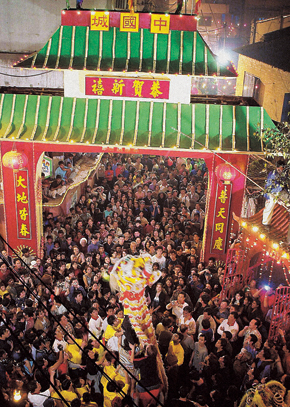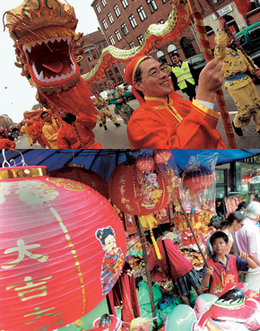 |
|
A festival of Chinese new year in Kolkata, India. AFP
|
New wave of settlers identify with their Chinese roots
By Bertil Lintner. independent journalist A disorderly line of Chinese jostle through check-in at the airport in Chiang Mai, the largest city in northern Thailand, on the way to board a flight to Bangkok. They are jabbering away, though not in the rough Yunnanese-accented Chinese long familiar in the markets of this city near China's Yunnan province, nor in Teochew, the Chinese dialect most commonly heard in Thai cities. They are speaking in the standard Mandarin of Mainland China. They're not tourists: Ill-fitting suits, battered briefcases and mobile phones mark them out as businesspeople flying to Bangkok to seek trade or jobs. They're among the new wave of migrants from China who have opened shops and eateries in Chiang Mai and other towns in northern Thailand in the past decade-a change that some local Thais are watching with unease. "As a Thai, I feel overwhelmed," a Bangkok-born woman now living in Chiang Mai told me. "Of course, Chinese have been moving south for centuries. But we have never seen as many new businessmen and settlers as now." Northern Thailand is only one of their destinations. A large number of Chinese have also moved into northern Burma, northern Laos, Cambodia and further afield-the Pacific islands, Australia, the United States, the Russian Far East, and Japan. More recently, South Korea has become a popular destination for Chinese migrants, legal and illegal, as it is a lot easier getting into this country than to Japan. Many of them are ethnic Koreans from Manchuria, or Han Chinese posing as ethnic Koreans to blend in better.Furthermore, the new migrants are not like their predecessors, who spoke regional dialects and exhibited little nationalism, identifying mainly with the localities in China from which they came. The recent arrivals not only speak the national language but also tend to identify with China as a whole. According to Andrew Forbes, a Chiang Mai-based China expert who has spent more than 20 years studying China's relations with Southeast Asia: "The new-wave Chinese are very different from those who migrated in the past. They've grown up in a country, which is far more unified than before. There's now a different sense of being Chinese. The new migrants are patriotic and loyal to the motherland." Nyiri Pal, a Hungarian sinologist and academic, argues that, unlike earlier Chinese settlers in Southeast Asia, the United States and Australia, these new migrants do not feel they have stopped being part of China. They see themselves not as local minorities, Nyiri told me when we met in Budapest, but as a "global majority" with an attachment to China that has nothing to do with territorial nationalism. Not only is China their ethnic and cultural base, but it remains the foundation of their economic success-a place where they continue to invest in and draw on. The Chinese authorities are perhaps not actively encouraging this development, but there seems little doubt that they appreciate the benefits of migration from China. First of all, it serves as a social safety valve at a time when unemployment is high and young people are on the move inside the country. To emigrate then becomes an appealing option; if these emigrants had stayed in China, it could have resulted in social and political unrest. Also, when they have settled in other countries, they send money back to their families in China. Such remittances from abroad are an important source of national income in China. The third consideration is much more long-term: migration strengthens China's influence around the world. Nyiri showed me an article he had come across in a Chinese magazine which quoted the State Council's "Opinion on Unfolding New Migrant Work": "Since reform and opening, people that have left mainland China to reside abroad (called 'new migrants' for short) have continuously become more numerous. They are currently rising up as an important force within overseas Chinese and ethnic Chinese communities. In the future, they will become the backbone of forces friendly to us in America and some other developed Western countries. Strengthening new migrant work has important realistic meaning and deep-going, far-reaching significance for promoting our country's modernizing construction, implementing the unification of the motherland, expanding our country's influence and developing our country's relations with the countries of residence." One such country is actually Nyiri's own: Hungary. Fifteen years ago there were hardly any Chinese in Hungary. But the fall of communism in Europe opened new markets for private entrepreneurs and, ironically, many of them came from the world's last major communist-ruled country, China. There are now between 20,000 and 40,000 Chinese in Hungary, and most of them have arrived by a very long train ride from Vladivostok across the border in the Russian Far East. It is also obvious that China's growing political and economic clout has given the recent arrivals in Hungary, Southeast Asia and elsewhere greater confidence and assertiveness. But this sense of national pride is also a factor that has provoked tensions between recent migrants and older settlers, who fear that it could reignite latent animosity and reinforce longstanding suspicions towards ethnic Chinese communities in their adopted countries. And there have been signs of such incipient hostility. For example, in May 1999, 300 Chinese amassed outside the U.S. embassy in the Cambodian capital of Phnom Penh to protest against the bombing of the Chinese embassy in Belgrade, which the Americans asserted was a mistake. A smaller gathering of ethnic Chinese Cambodians then held a counter-demonstration, heckling the protesters. "You're not our brothers," one of them yelled. "Your people killed my people during Pol Pot's time." Cambodia's Chinese suffered badly during the 1975-1979 Khmer Rouge regime, led by Pol Pot, who was backed by Beijing. In the northern Burmese city of Mandalay, newly arrived Chinese settlers have purchased shops, restaurants, hotels, karaoke bars-and identity papers. Given the relative wealth of the Chinese migrants, local officials in Burma are reluctant to enforce immigration laws. Indeed, a well-known Burmese novelist, Nyi Pu Lay, was even arrested as early as 1990-when the first groups of Chinese began to pour in to Mandalay-and sentenced to ten years imprisonment for writing a story called "The Python," a satire on Chinese settlers moving into the city and squeezing out the Burmese. Burma's old Chinese communities-mostly of Fujianese and Cantonese origin-feel uncomfortable with this renewed racial tension; older Sino-Burmese remember how mobs ran amok in Rangoon's Chinatown in 1967, burning and plundering Chinese shops at a time when the country was in deep economic crisis. So what drives this latest Chinese diaspora? Chin Ko-lin, a Burma-born Chinese who now is a professor at the School of Criminal Justice at Rutgers University in the U.S., says the exodus stems from policy changes in China after 1978, when Washington and Beijing established diplomatic relations. To qualify for most-favored-nation status, China relaxed emigration regulations in 1979, and the flow of migrants began.
 |
|
A Chinese festival in Copenhagen, Denmark.(above) China town in Bankok, Thailand.( bottom) AFP
|






